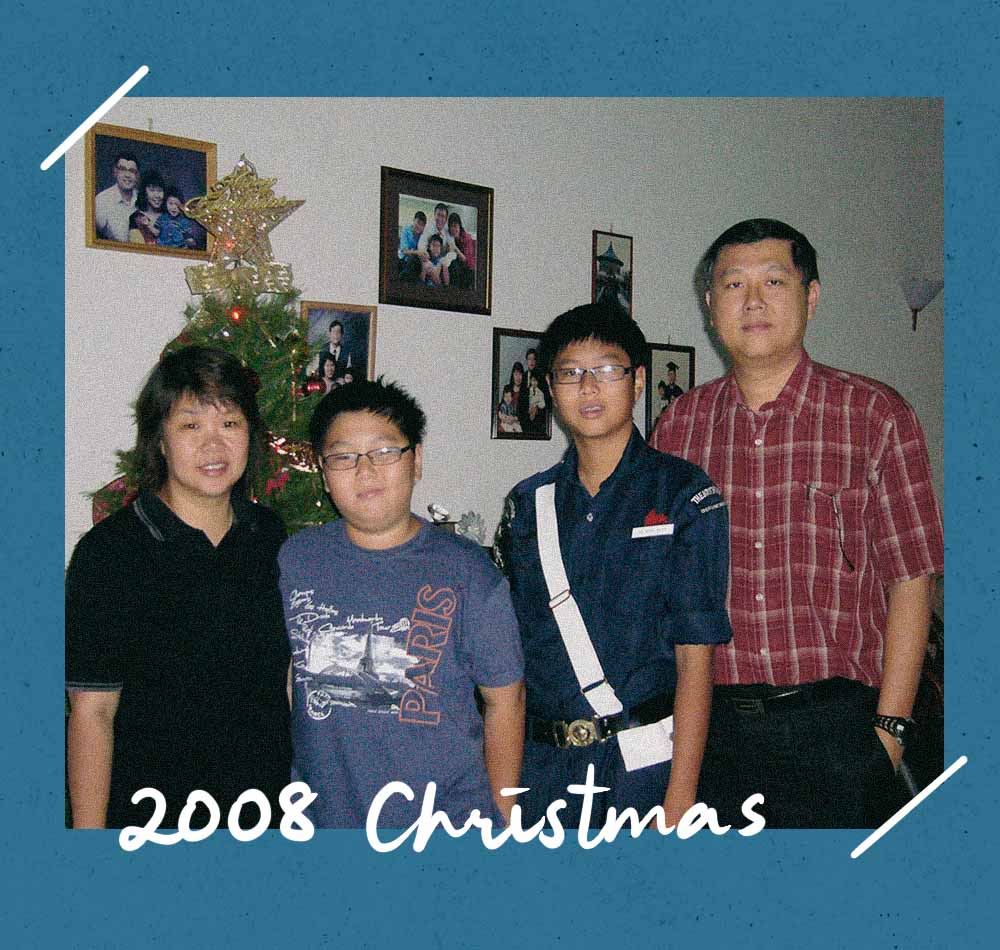
Even before Dr. Ho Yew Kee’s two sons were born, he would place his hand on his wife Huey Huey’s pregnant belly and pray for them. And when they were babies, the couple would place their hands on their sleeping infants’ chests and pray for them every night.
This culture of prayer continued as Weng Shian and Yi Shian grew up and started going to kindergarten. “Life in Singapore is very busy. Nevertheless, we found time to pray with the boys when putting them to bed,” says Yew Kee, a cluster director and accounting professor at the Singapore Institute of Technology.
“If you see prayer as a conversation with God, then it can take place anytime. It doesn’t always have to be a long liturgy with all the right lingo—even a one-sentence prayer is still a prayer,” he says.
This principle—of being regular yet flexible in nurturing their kids’ time with God—is something that Yew Kee and Huey Huey have tried to do from the very beginning. Teaching them about their relationship with God should begin when children are young, stresses Yew Kee. “They are generally compliant and receptive in their early years. We as parents just have to show them, and they are likely to follow.”
Starting Small and Simple

Imparting their faith to their two boys involved small but intentional steps. When Weng Shian and Yi Shian entered primary school, the couple began to teach them how to pray on their own. “We started by asking them to pray a very, very simple prayer, such as by telling God, ‘Today I have an exam, can You help me?’” says Huey Huey, who heads the finance team at healthcare charity Lions Home for the Elders.
Prayer doesn’t always have to be a long liturgy with all the right lingo—even a one-sentence prayer is still a prayer.
The family would also read the Bible together during their regular devotion time, which they attempted to do weekly. They started by giving the children a verse to read together, and as they grew older, progressed to longer passages and chapters.
While the specifics of every family’s devotion time will be different, what’s important to remember is that it should be age-appropriate, taking into account a child’s developmental stage, energy and concentration levels, as well as any exigencies, says Yew Kee. “Parents also shouldn’t feel pressurised to see it as a ‘sermon time’, he adds.
The Ho family started off by selecting thematic key verses like John 3:16 or memorable Bible stories such as Noah’s Ark that encapsulated different facets of God’s character and the gospel. As the children matured, they chose books like the Gospel of John that were easy to understand and useful for teaching gospel truths.
Family devotion time should be age-appropriate, taking into account a child’s developmental stage, energy and concentration levels, as well as any exigencies.
When their sons became teenagers, the family began to go through the book of Proverbs, paying particular attention to Proverbs 31. Says Yew Kee: “Because they are boys, we wanted to impress upon them the value of finding a good wife (v. 10–31).”
After reading a verse or passage, Yew Kee would bring up one or two lessons or reflection questions for them to think and talk about. The family would then take turns to share their prayer requests and pray for each other.
No Request Too Small
One way the couple tried to schedule a daily prayer amid the hustle and bustle of family life was before meals. “They love eating, so we ‘enticed’ them to give thanks before meals,” jokes Yew Kee.
The family started a prayer journal when the boys entered secondary school. They would record down their prayer requests, and take turns to pray for the person on their right or left.
The following week, the family would look through their earlier requests, and put a tick next to answered ones. “We did this to keep a record of God’s faithfulness, and to teach our children that no requests are too small for God that He is not interested to answer, however He chooses,” Yew Kee says.
We want to show our children that we can boldly ask our heavenly Father for even the most mundane things anytime.
He recalls a prayer request from Yi Shian, who was then 16 years old and was awaiting the results of his junior college’s application. “He wrote: ‘Please let me enter into the JC of my choice.’ And then, in a very subtle way, he wrote: ‘God, can You increase my allowance?’ Maybe that wasn’t actually to God, but to us as parents,” he laughs.
What encouraged Yew Kee and Huey Huey was that both sons were willing to share what was happening in their lives during their teenage years, and trusted their parents to pray for them. “They might be capable of handling these situations, but their requests spoke of their dependence upon the almighty God,” says Yew Kee.
Most importantly, the family tries to make prayer an “ordinary conversation of interest”, says Yew Kee. “While praise, thanksgivings, and worship are part and parcel of our prayers, we also want to show our children that we can boldly ask our heavenly Father for even the most mundane things anytime.”
Looking back, Weng Shian says that reading their family prayer journal now reminds him of how the Lord has been faithful throughout his life. “I see how God has been working from the time that I prayed about something five to eight years ago, all the way until now,” he recalls.
Today, the family has a WhatsApp chat group in which they text their prayer requests every Monday. And Yew Kee and Huey Huey continue to make it a point to pray for their children before any major events, such as exams and interviews, and to share that they’ve prayed for them.

Not a Sprint, but a Marathon
Of course, there were times when their sons struggled with family devotions as teenagers, says Huey Huey. “They would often say that they don’t have time,” she says. “Things like, ‘Tomorrow is my test, I need to study,’ or ‘Liverpool is playing, can you go a bit faster?’”
To address this, the family set aside a specific time and duration for uninterrupted family devotion on Sunday nights. But there were occasions when both sons would still be reluctant to participate. Huey Huey says: “They would say, ‘Can I just pray one sentence?’ or ‘I have nothing to pray for.’”
In such times, she and her husband would not force them to share, but give the two boys space. “They will always have something to share—it’s just a matter of whether they want to share,” says Yew Kee. “Teenagers are like windows: sometimes they’re open, sometimes they’re closed. We have to be patient to know when they open up, and that’s when we can have conversations.”
“We always tell our sons that we don’t want our time with God to merely be a ritual with no meaning,” he continues. “We remind them that God has no grandchildren, only children. As second-generation Christians, their faith must not be predicated on ours. They must encounter God personally for themselves.”
Teenagers are like windows: sometimes they’re open, sometimes they’re closed. We have to be patient to know when they open up, and that’s when we can have conversations.
“As parents, we just have to understand that imparting our faith is a marathon race, not a sprint. It’s a long-term journey, where we hold their hands and lead them one step at a time towards the Lord,” says Yew Kee.
Salvation Belongs to God
As Weng Shian and Yi Shian progressed through secondary school, junior college, university and now into adulthood, they continued asking their parents to pray for them. That’s when both parents realised that while their sons had grown up and were independent, they could continue to be intercessors for them.
While Yew Kee and Huey Huey do what they can to bring their sons to a living faith, their confidence and consolation is that salvation belongs to God alone (Psalm 3:8), says Yew Kee.

Today, Weng Shian is 29 years old and Yi Shian is 26. Both sons are currently working and attending church in the US, with Weng Shian serving as a mentor in the youth fellowship.
Having grown up in a home where prayer was prioritised, Weng Shian’s advice to parents who want to teach their children about the value of prayer is to “start your young children off with praying together as a family, and slowly guide them to having their own prayer and personal walk with God.”
Adding on, Yi Shian says parents can also seek to encourage questions about God and their faith as early as possible. This could mean asking their children about what they think about their learning at Sunday school or in sermons, and even doing age-appropriate apologetics with them.
At the end of the day, what we want to see is the child continuing to go to church and holding on to their Christian faith—even without the parents.
For the Ho family, this meant being open to discuss and even critique sermons and engaging in theological and doctrinal debates, and not being afraid to tackle the hard questions.
“The last thing that a parent wants is for their child to go through the motions and not really understand why or what they’re believing,” says Yi Shian. “At the end of the day, what we want to see is the child continuing to go to church and holding on to their Christian faith—even without the parents.”
No Parenting Success Formula
Looking back on close to three decades of parenthood, Yew Kee shares that there is no single or proven success formula when it comes to raising good and godly children—just dependence on God’s wisdom and grace, humility to learn from mistakes, and a fear of and reverence for the Lord.
“We just have to be patient, persevering, and keep doing what is right. Be flexible and dynamic in your parenting, keep talking to your spouse, and let your children experience the security and reality of God through the way you love and parent them,” says Yew Kee.
“But at the end of the day, we must acknowledge that it is not our own strength or agenda that will carry us through. It is all God’s grace and mercy.”
Adapted from a video interview conducted by Adam Road Presbyterian Church.



